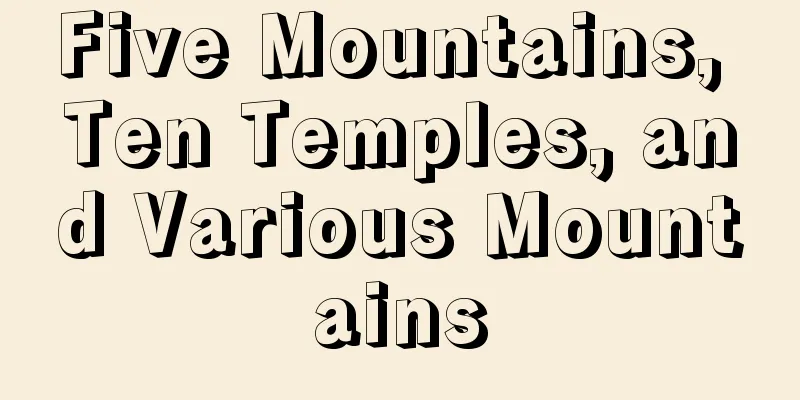Ten Commandments - Jikkinsho

|
A collection of moral tales from the mid-Kamakura period. It is also read as "Jikkunsho." From the preface, we learn that it was compiled in 1252 by an old recluse who lived in a hermitage at the foot of Higashiyama Mountain to show young boys the way of life, be it good, evil, wisdom or foolishness. There are theories that suggest that the editor was Sugawara Tamenaga or Rokuhara Jirozaemon Nyudo (Yuasa Munenari), and although there is no clear evidence for either, the latter is more likely. The title of the book comes from the fact that it lists 10 virtues, namely, "How to determine one's behavior," "How to avoid arrogance," "How not to insult people's morals," "How to warn people against excessive talk," "How to select friends," "How to maintain loyalty, integrity, and uprightness," "How to be sensible," "How to tolerate all things," "How to stop resentment," and "How to acquire ordinary talents and arts." The sources of the 540 or so included stories are widely from Japanese and Chinese classics, suggesting the education of the editor. This book has been widely read, especially since the early modern period, due to its Confucian didacticism, but it has not necessarily been highly praised in recent years due to its nostalgia for the aesthetic sense of the previous dynasty and the compromising and passive nature of the lessons it teaches from the perspective of a court attendant. However, some see it as a book backed by the shrewd spirit that enabled people to skillfully survive the turbulent period following the Genpei War, and it also contains many interesting tales not found in other books, such as those related to the Heike clan. It can be said to be a book that carries important literary historical issues. [Kinoshita Suichi] ``Jikunsho Detailed Explanation'' by Naoto Ishibashi (1902, Meiji Shoin) ▽ ``Research Materials for Japanese Classical Literature 3: Narrative Literature'' (1984, Meiji Shoin) Source: Shogakukan Encyclopedia Nipponica About Encyclopedia Nipponica Information | Legend |
|
鎌倉中期の教訓説話集。「じっくんしょう」とも読む。その序文から、建長(けんちょう)4年(1252)、少年たちに善悪賢愚の処世の道を示すために、東山の麓(ふもと)に庵(いおり)を結ぶ老遁世(とんせい)者によって編まれたことがわかる。この編者を菅原為長(すがわらのためなが)、あるいは六波羅二﨟左衛門(ろくはらじろうざえもん)入道(湯浅宗業(むねなり))と推定する説があり、どちらも明証を欠くが、後者に比較的高い蓋然(がいぜん)性が認められる。書名の由来は、「可定心操振舞事」、「可離憍慢事」、「不可侮人倫事」、「可誡人上多言等事」、「可撰朋友事」、「可存忠信廉直旨事」、「可専思慮事」、「可堪忍諸事事」、「可停怨望事」、「可庶幾才能芸業事」の10条の徳目を掲げて、各徳目ごとに例話としての説話を集めていることにある。総数540話ほどの収載説話の出典には和漢の典籍が広く用いられ、編者の教養をうかがわせる。本書はその儒教的教訓性からとくに近世以降広く読まれたが、前代王朝的美意識を引き継ぐ懐古性、宮仕えの立場から説く教訓の妥協的、消極的性格などをもって、近年はかならずしも高い評価を得ていない。しかしながら、源平争乱以降の動乱期を巧みに生き残ったしたたかな精神に裏打ちされた書という見方もあり、また平家関係説話など、他書にみえない興味深い説話も少なくない。重要な文学史的課題を担う書といえる。 [木下資一] 『石橋尚宝著『十訓抄詳解』(1902・明治書院)』▽『『研究資料日本古典文学3 説話文学』(1984・明治書院)』 出典 小学館 日本大百科全書(ニッポニカ)日本大百科全書(ニッポニカ)について 情報 | 凡例 |
Recommend
Gummy shark (star shark)
A marine fish of the family Lumpsharkidae in the o...
Meteorite - Inseki (English spelling) meteorite
A general term for solid planetary material that ...
Brahmadeya Village - Brahmadeyasonraku (English spelling) Brāhmadēya
A village form common in the Chola dynasty of sout...
Six volumes of ancient and modern waka poetry
A collection of waka poems selected by subject. A...
Professor Unrath - The End of a Tyrant
...It is also known for making Marlene Dietrich, ...
Satanism - akumashugi (English spelling) diabolism
The idea of worshiping the devil, the embodimen...
Iobates
…After accidentally killing someone, he fled to A...
Gasol - Gasol
... After that, the second oil shock at the end o...
Lee Kwang-soo
Korean writer and thinker. His pen name was Shune...
Growth hormone
It is a simple protein hormone secreted from the ...
O'Higgins, Bernardo
[Born] August 20, 1778. Chang Died October 24, 184...
Balandier, G.
For example, Elman R. Service, in his book Primit...
Public authority
In public law relationships, it refers to the leg...
Abe Masato
Year of death: April 20, 1887 Year of birth: Bunse...
Daijuji Temple
This temple is located in Kamoda-cho, Okazaki Cit...









